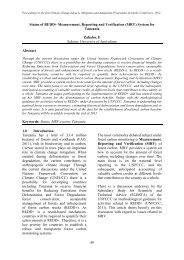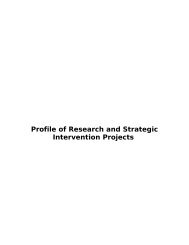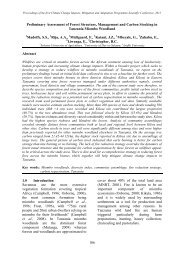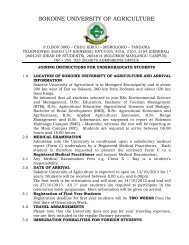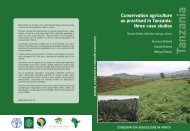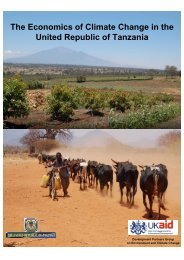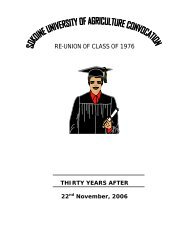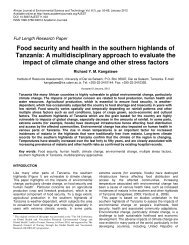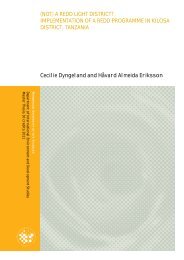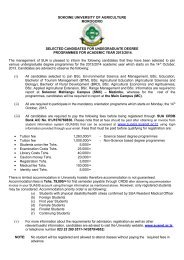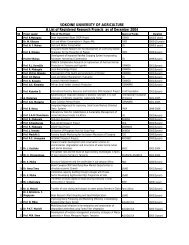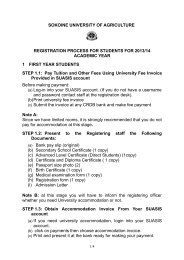Call for Concept Notes - Sokoine University of Agriculture
Call for Concept Notes - Sokoine University of Agriculture
Call for Concept Notes - Sokoine University of Agriculture
You also want an ePaper? Increase the reach of your titles
YUMPU automatically turns print PDFs into web optimized ePapers that Google loves.
Climate Change Impacts, Adaptationand Mitigation (CCIAM) Programme inTanzaniaCCIAM Programme Coordination Office<strong>Sokoine</strong> <strong>University</strong> <strong>of</strong> agricultureProgramme P.O. Box 3151Chuo KikuuMorogoroANNOUNCEM ENT AND CALL FOR CONCEPT NOTESFOR RESEARCH PROJECTS TO BE UNDERTAKENUNDER THE CCIAM PROGRAMMEThe CCIAM (Climate Change Impacts, Adaptation and Mitigation) Programme wishes to announce andcall upon researchers from participating institutions to submit research concept notes under the themeslisted below.The concept notes will then be subjected to a peer review process following which authors <strong>of</strong> selectedconcept notes will be invited to submit full research proposals as shall be guided by the Joint SteeringCommittee <strong>of</strong> the CCIAM programme.1.0 BACKGROUNDThe Royal Norwegian Government and the Government <strong>of</strong> the United Republic <strong>of</strong> Tanzania have signedan agreement to support the participation <strong>of</strong> Tanzania in the development and implementation <strong>of</strong> theprogramme to address challenges <strong>of</strong> climate change with the purpose <strong>of</strong> increasing Tanzania’sparticipation in the mitigation <strong>of</strong> and adaptation <strong>of</strong> the effects <strong>of</strong> climate change.Developing, optimizing and sustaining readiness and adequacy in capacity to address the challengesbrought by climate change will require a number <strong>of</strong> interventions through raising awareness, training tobuild capacity at various levels, and conducting research and outreach activities.The research component has the following specific objectives which are translated into thematic areas:1) Development <strong>of</strong> appropriate climate change mitigation and adaptation strategies in <strong>for</strong>estry, otherland uses, ecosystems and biodiversity management.2) Assessment <strong>of</strong> climate change impacts and vulnerability on ecosystem services and livelihoods underREDD initiatives.3) Policy and legal framework analysis <strong>of</strong> climate change adaptation and mitigation with emphasis oneconomic efficiency, ecological effectiveness and wider political legitimacy.Further elaboration on focus Areas <strong>for</strong> each <strong>of</strong> the research themes above as well as Guidelines on thepreparation and submission <strong>of</strong> the concept notes is provided in the subsequent sections.A n n o u n c e m e n t a n d C a l l f o r C o n c e p t N o t e s f o r R e s e a r c h P r o j e c t s t o b e U n d e r t a k e nu n d e r t h e C C I A M P r o g r a m m e . 1 2 t h F e b r u a r y 2 0 1 01
Theme 1: Development <strong>of</strong> appropriate climate change mitigation and adaptationstrategies in <strong>for</strong>estry, other land uses, ecosystems and biodiversitymanagement Quantification <strong>of</strong> the potential <strong>for</strong> <strong>for</strong>estry based carbon <strong>of</strong>f-sets and carbon trading Development <strong>of</strong> <strong>for</strong>est carbon assessment and monitoring system Determine effective and efficient payment system <strong>for</strong> REDD in Tanzania Determine appropriate approach to limit de<strong>for</strong>estation and <strong>for</strong>est degradation inTanzania <strong>for</strong> its participation in REDD Modelling <strong>of</strong> impacts <strong>of</strong> climate change and management scenarios in <strong>for</strong>estry, land-use,ecosystem and biodiversity Assessment <strong>of</strong> Small Holder Forestry Potential <strong>for</strong> Climate Change Mitigation,Adaptation and Rural Development Financial analysis <strong>of</strong> Carbon sequestration and storage Development <strong>of</strong> strategic interventions <strong>for</strong> adaptation in <strong>for</strong>estry, and other land usesincluding human settlements. Assessment <strong>of</strong> innovative agricultural land use and farming systems <strong>for</strong> adaptation toand mitigation <strong>of</strong> climate change to support REDD initiatives. Development and testing <strong>of</strong> various range land management strategies <strong>for</strong> the purpose<strong>of</strong> reducing pressure on <strong>for</strong>est resources <strong>for</strong> adaptation and mitigation to climatechangeTheme 2:Assessment <strong>of</strong> climate change impacts on and vulnerability <strong>of</strong>ecosystem services and livelihoods under REDD initiatives:Establishment <strong>of</strong> trends and projections <strong>of</strong> ecosystem services associated with climatestressors.Model effects <strong>of</strong> alternative management options on ecosystem services underchanging climate.Development <strong>of</strong> methods to describe relationships between ecosystem services,climate stressors and management responses.Assessment <strong>of</strong> local climate change vulnerability <strong>of</strong> biodiversity and <strong>for</strong>est relatedlivelihoods and adaptation options.Assessment <strong>of</strong> macroeconomic impacts <strong>of</strong> climate change in <strong>for</strong>est resourcemanagement and its implication <strong>for</strong> different ecological zones.Integrated analysis and synthesis <strong>of</strong> lessons learned from adaptation options andmacroeconomic impacts.A n n o u n c e m e n t a n d C a l l f o r C o n c e p t N o t e s f o r R e s e a r c h P r o j e c t s t o b e U n d e r t a k e nu n d e r t h e C C I A M P r o g r a m m e . 1 2 t h F e b r u a r y 2 0 1 02
2.0 ELIGIBILITYThe call is open to researchers in collaborating institutions in Tanzania and in Norway. There arefour collaborating institutions in Tanzania namely; Tanzania Meteorological Agency (TMA), <strong>Sokoine</strong><strong>University</strong> <strong>of</strong> <strong>Agriculture</strong> (SUA), <strong>University</strong> <strong>of</strong> Dar es Salaam (UDSM) and Ardhi <strong>University</strong> (ARU).There also collaborating institutions in Norway that are coordinated through the <strong>University</strong> <strong>of</strong> LifeSciences (UMB). <strong>Concept</strong> notes <strong>for</strong> collaborative research projects should be demand driven andaim at enhancing research activities related to mitigation and adaptation <strong>of</strong> climate change impactswith a strong emphasis on REDD.It is expected that prospective research projects may be conducted in areas where the REDD pilotprojects areas will be undertaken. Some <strong>of</strong> such areas will be announced during the InceptionWorkshop <strong>of</strong> this programme to be conducted at Ardhi <strong>University</strong> in Dar es Salaam on the 19 thFebruary 2010. All potential authors <strong>of</strong> concept notes are encouraged to attend the inceptionworkshop.3.0 FORMAT FOR DEVELOPING CONCEPT NOTESA concept note is a brief outline <strong>of</strong> a proposed research. The concept note should:• Outline background, spell out research problem, objectives, methodology, location wherethe work is expected to be carried out and indicative budget;• Identify the principal researcher and other researchers involved in the project, theirqualifications, specific roles and their track records; and• Not exceed 3 pages, excluding the attachments - with single spaced paragraphs and font size12 Times New Roman in Micros<strong>of</strong>t Word.If the concept note is accepted, one will be invited to prepare a full proposal. However, one maybe asked to clarify certain issues be<strong>for</strong>e proceeding to the full proposal stage. In some casesconcept notes on related topics may be merged into one.<strong>Concept</strong> notes addressing more than one <strong>of</strong> the above themes are encouraged. The organization <strong>of</strong>the concept note should be as outlined in Table 1 below:A n n o u n c e m e n t a n d C a l l f o r C o n c e p t N o t e s f o r R e s e a r c h P r o j e c t s t o b e U n d e r t a k e nu n d e r t h e C C I A M P r o g r a m m e . 1 2 t h F e b r u a r y 2 0 1 04
Table 1: Organization and narrative summary <strong>of</strong> the concept note1. Research Title15 - 20 words maximumThe title should capture reader's attention on the essentialtheme(s) <strong>of</strong> the proposed research.- Show clearly what is being investigated.- Have a concise and focused title.- Be short, preferably not more than one line.- Avoid unnecessary punctuation (commas, colons, semi-colons).-Should not repeat keywords.2. Selected Thematic Area Select one <strong>of</strong> the three thematic areas and state the majorresearch focus one intends to accomplish in the project3. Research Problem A short summary <strong>of</strong> the research problem. What does theinvestigator want to find out?What will be known after doing this research?What are the research questions?Use a clear and logical style in writing.4. Background A concise review <strong>of</strong> the main research work and current issuesin the specific subject area.What is already known about this specific subject?This is not a literature review; you do not need to do one <strong>for</strong> aconcept note.5. Objectives Should clearly state the overall and specific objectives as well ashypothesis.6. Methodology Outline clearly the methods and approaches <strong>of</strong> data collectionand analysis.7. Expected outputs andoutcomes <strong>of</strong> the proposedprojectClearly outline the outputs and outcomes that the project isexpected to generate8. Location Indicate clearly where the research will take place andjustification <strong>for</strong> the choice <strong>of</strong> the site(s).9. Researchers The principal researcher should be identified.The name(s) and full contact details collaborating researchersshould be provided.State briefly the qualifications, research experience <strong>of</strong> allresearchers and their roles in the project implementation.Multidisciplinary, multi-institutional collaboration is highlyencouraged.Attach short CVs (maximum three pages each)10. Budget lines Provide indicative budget with key cost centres11. Project Timeframe Show the duration <strong>of</strong> the project and the timeline <strong>for</strong> majoractivitiesA n n o u n c e m e n t a n d C a l l f o r C o n c e p t N o t e s f o r R e s e a r c h P r o j e c t s t o b e U n d e r t a k e nu n d e r t h e C C I A M P r o g r a m m e . 1 2 t h F e b r u a r y 2 0 1 05
4. INDICATIVE RESEARCH PROJECT BUDGET AND PROJECTS’DURATIONThe duration <strong>for</strong> prospective research projects under this programme will be three years.Since the programme is <strong>for</strong> five years, projects that per<strong>for</strong>m well may be extended <strong>for</strong> anothertwo years, whereas projects that will not per<strong>for</strong>m well may be replaced by other researchprojects whose call will be made in the third year <strong>of</strong> the programme.It is planned that the programme may be able to support up to 12 research projectsdistributed optimally among all the participating institutions.The indicative budget <strong>for</strong> each project may rise from TZS 50m in the first year through TZS70m in the second year and up to TZS 100m in the third year.Prospective authors <strong>of</strong> concept notes who may have queries concerning the compliancestipulations, other requirements and technical details <strong>of</strong> this <strong>Call</strong> are invited to contact theProgramme Coordinator <strong>for</strong> clarification. All queries should be submitted by email addressedto cciam@suanet.ac.tz, and cciam@gmail.com.5. INVOLVEMENT OF POSTGRADUATE STUDENTS IN RESEARCHPROJECTSIn addition to this announcement and call <strong>for</strong> research concept notes, the CCIAM programmewill in April 2010 announce and invite applications <strong>for</strong> candidates with applicablequalifications to compete <strong>for</strong> award <strong>of</strong> Masters and PhD Scholarships. A total <strong>of</strong> 25 Mastersand 17 PhD Scholarships will be made available <strong>for</strong> competition. Candidates granted suchscholarships shall be required to conduct the research part <strong>of</strong> their studies within theapproved CCIAM research projects based on the themes above.To that effect, each research project will be allocated at least two Masters Students and atleast one PhD student. Each such postgraduate student will come into the project withadditional funds provided separately by the programme. Such funds shall be paid directly to theprojects absorbing the students. Research projects are not expected to budget <strong>for</strong>maintenance costs or university fees <strong>for</strong> such students. The students will be coming intoprojects to provide additional human resource <strong>for</strong> implementation <strong>of</strong> the respective approvedresearch project activities.A n n o u n c e m e n t a n d C a l l f o r C o n c e p t N o t e s f o r R e s e a r c h P r o j e c t s t o b e U n d e r t a k e nu n d e r t h e C C I A M P r o g r a m m e . 1 2 t h F e b r u a r y 2 0 1 06
6. SUBMISSION OF THE CONCEPT NOTESubmission should be in a <strong>for</strong>m <strong>of</strong> one hard and two electronic copies (one in word andone in pdf <strong>for</strong>mat). The deadline <strong>for</strong> submission <strong>of</strong> both hard and electronic copy is 19 thMarch 2010 at 15:30 East Africa time. <strong>Concept</strong> note received after the deadline willnot be included in the evaluation.In electronic submission <strong>of</strong> concept notes as attachments to emails, ensure that the filename bears the surname <strong>of</strong> the Principal Investigator as a prefix to the file name thatis:”Surname <strong>of</strong> principle investigator - CCIAM <strong>Call</strong> <strong>for</strong> <strong>Concept</strong> note 2010” (e.g. Kangalage– CCIAM call <strong>for</strong> <strong>Concept</strong> note 2010).The hard copy should be submitted together with a covering letter from the PrincipalInvestigator and routed through the respective Institutional Programme Coordinator (whoshould have a copy <strong>of</strong> the same to retain) to the Programme Coordinator (PC) throughthe following address:The CCIAM Programme CoordinatorCCIAM Programme Coordination Office<strong>Sokoine</strong> <strong>University</strong> <strong>of</strong> <strong>Agriculture</strong>P.O. Box 3151Morogoro, Tanzania.An electronic copy <strong>of</strong> the document should be emailed to:cciam@suanet.ac.tz, and cciam@gmail.com.The decisions taken as a result <strong>of</strong> the review process will be made known to the PrincipalInvestigator <strong>of</strong> each <strong>Concept</strong> note by the 5 th week after the submission. Tentatively, by23 rd April 2010 at the latest.A n n o u n c e m e n t a n d C a l l f o r C o n c e p t N o t e s f o r R e s e a r c h P r o j e c t s t o b e U n d e r t a k e nu n d e r t h e C C I A M P r o g r a m m e . 1 2 t h F e b r u a r y 2 0 1 07



